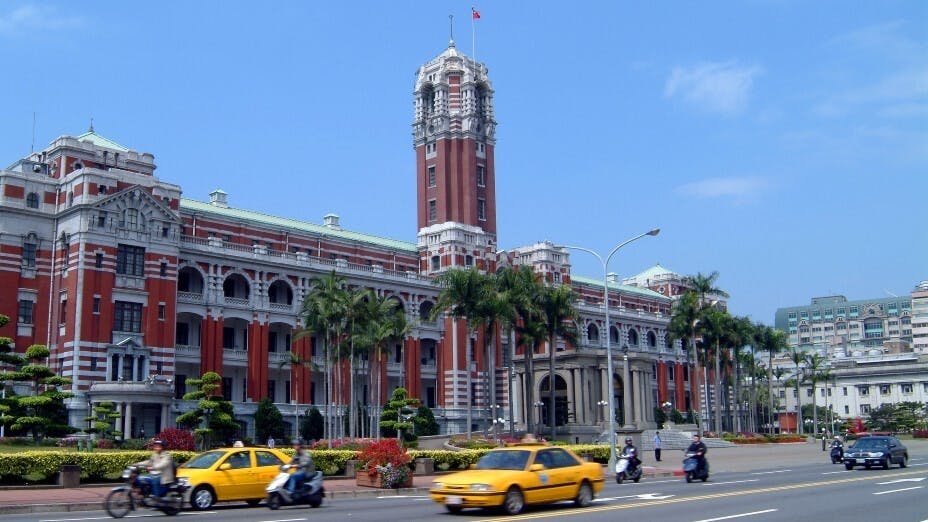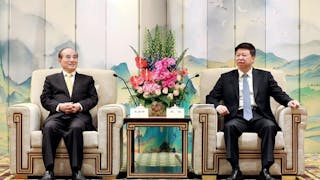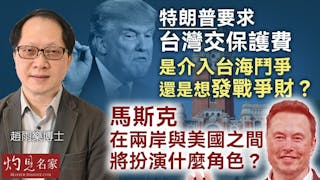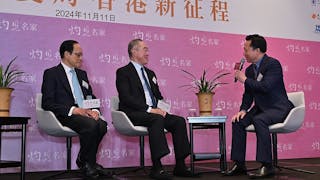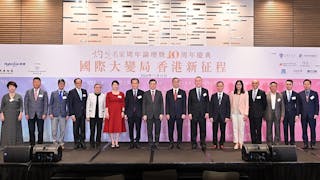最近,台灣總統參選人、民眾黨的柯文哲和國民黨的參選人侯友宜再次引發了關於兩岸服貿協議,即《海峽兩岸服務貿易協議》的爭論。該協定2013年6月在上海簽署,但於2014年3月「太陽花學運」期間流產,反對派指責服貿「以經逼統」,而當時的國民黨政府「向大陸靠攏」。
柯文哲和侯友宜主張重啟服貿談判,稱該協議是台灣與大陸雙贏的安排。
國台辦批民進黨阻撓協議生效
有趣的是,大陸國務院台辦發言人朱鳳蓮回應,《海峽兩岸服務貿易協議》是一個互利互惠的「好協議」。 她補充說,《海峽兩岸服務貿易協議》歷經10年風雨洗禮,愈來愈多島內人士認識到,這是一份互利雙贏的好協議。朱鳳蓮強調,最重要的是,服貿協議有利於加強兩岸服務業合作、創造更多就業機會,共同應對經濟全球化挑戰。朱鳳蓮批評台灣民進黨阻撓協議生效,令台灣業界和民眾利益深受其害。
針對柯、侯的主張,民進黨立委林楚茵等部分人士批評大陸方面堅持以「九二共識」作為貿易關係的基礎,並指責柯、侯「認同」大陸的策略。其他民進黨人士立即指責柯文哲試圖吸納「藍營」或國民黨陣營的選票。
針對民進黨的批評,台灣立法院國民黨黨團批評民進黨口口聲聲說《海峽兩岸經濟合作框架協議》(ECFA)是「糖衣毒藥」,卻至今沒有廢止。
民進黨立法院黨團幹事長劉世芳則辯稱,服貿如果要開放,影響服務業從業人口超過400萬人。劉世芳似乎沒有透露她是如何得出這個估計數字的。另一名民進黨立法院議員莊瑞雄則認為,服貿的重點在於台灣是否接受「一中原則」和「九二共識」。
執政的民進黨反覆強調同一主題,即反對「一中原則」和「九二共識」──這一立場遭到了大陸方面的堅決反對。
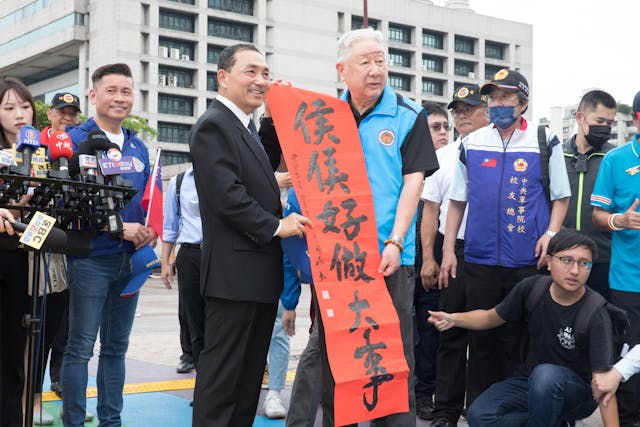
柯文哲籲重視兩岸接觸誠意
6月28日,柯文哲闡述了對兩岸服務貿易協議的立場。首先,他認為「九二共識」沒有找到明確的定義,因此引起了很多人的不滿。不過,柯文哲呼籲民眾不僅要重視兩岸實質性互動,更要重視兩岸接觸的誠意。
柯文哲以務實的態度來處理這場爭論,要求台灣民眾擱置對「九二共識」及其相關定義的政治爭論。相反,台灣人民特別是執政黨,應該通過務實的兩岸互動來尋求具體的經濟利益。
台灣陸委會6月29日加入辯論,表示沒有必要重啟《海峽兩岸服務貿易協議》。發言人稱,「大多數業者與學者專家並不認為有重啟服貿、貨貿談判的急迫及必要性」。發言人還指,大陸「希望跟台灣做更緊密的經濟上結合,然後用經濟套牢台灣」,而大陸的經濟環境這幾年發生了極大變化,所以用當年的時空背景來探討現在是否重啟,「沒有這樣的意義」。
不過,柯文哲反駁了那些反對重啟服貿的人。他在6月29日表示,民進黨政府將兩岸協議視為「零和遊戲」,將問題過於簡單化。他表示,問題的關鍵不是服務貿易開放與否,真正的問題是討論哪些職業領域應該開放、哪些行業應該保護。柯文哲認為,即使台灣與其他國家的自由貿易協定談判也花費了數年時間,當地產業也必須慢慢適應。柯文哲對民進黨的立場提出了批評,並說政府過於將事情簡單化,真正的談判必然更加複雜。
客觀地說,柯文哲處理兩岸貿易協議的做法,遠比民進黨政權為了「反中」而採取反對立場更加務實和可行。柯文哲主張將協議分解為不同的職能和服務部門,這比民進黨的賴清德或國民黨的侯友宜要老練得多。
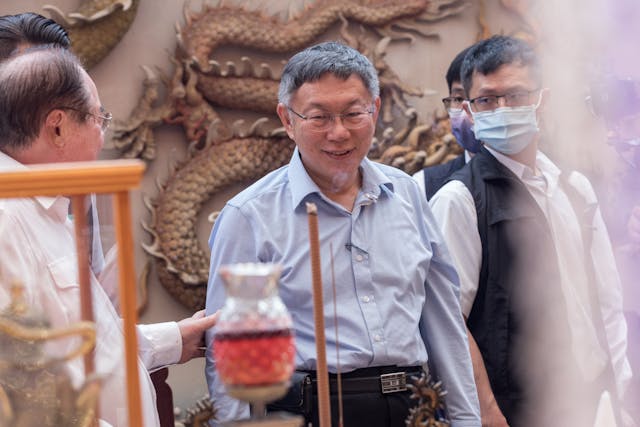
賴清德認為協議過時
6月29日,民進黨總統參選人賴清德就兩岸貿易協議發表了自己的看法,他認為該協議「已經過時」。 他認為,「走進中國的時代」已經過去,「台灣要走向世界,成為經濟的日不落國」。 賴清德認為,台灣政府必須投資於水、電等基本公用事業以及土地開發,以使台灣在貿易關係中全球化,包括與越南、印度和菲律賓等國家接觸的需要。賴清德甚至質問一些台灣本地人,是否歡迎大陸人來台開牛肉麵店和美容院。
賴清德的論點是基於「反中」的政治意識形態。在蔡英文領導下,台灣一直採取「南向」和擴大與美國、日本等美國盟友及歐盟國家貿易關係的雙重政策。簡而言之,民進黨領導下的台灣貿易政策,最大限度地減少了對中國的依賴和交流,同時將觸角伸向東南亞、北美和歐洲。
然而,質疑當地台灣人是否歡迎大陸人來台灣開牛肉麵店和美容院,似乎有些極端了。正如柯文哲所建議的,一些服務業,也許包括美容院和牛肉麵店,可以受到保護,不受大陸投資的影響。賴清德利用極端案例嚇唬台灣選民,讓他們遠離兩岸貿易和服務協議安排的共同經濟利益。
國民黨侯友宜競選總統辦公室6月28日回應兩岸服貿爭議時表示,對外貿易談判有必要重新檢視、重新找出正確的策略。國民黨和民眾黨都提出了自己的立法版本,但立法院尚未將其納入討論和辯論議程。事實上,如果民進黨認為兩岸服貿協議「沒有必要」,那麼審視兩岸協議的立法被擱置也就不足為奇了。
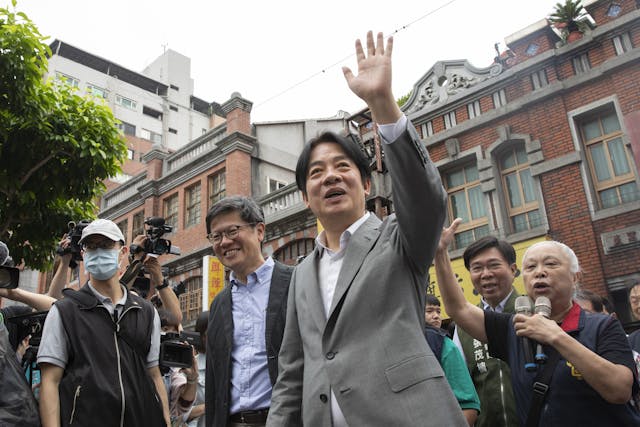
服貿協議爭論 成大選風向標
關於服貿協議的持續爭論兩岸關係具有重要影響。首先,如果民進黨執政,就沒有興趣也沒有動力去討論這個議題,反映出政治意識形態在兩岸貿易關係中的主導地位。
其次,隨着溫和的總統參選人柯文哲和侯友宜提出重啟服貿,民進黨的賴清德面臨壓力,重申執政黨反對兩岸加強貿易關係。
第三,柯文哲和侯友宜的主張將吸引台灣民眾的選票,他們認為更緊密的兩岸貿易關係是互惠互利、經濟有利可圖的。確實,一些本地工業和服務業必然反對大陸資本和投資進入,但這些行業可以像柯文哲主張的那樣得到保護。
第四,柯文哲是第一個敢於提出恢復兩岸貿易協議,並提出需要確定哪些服務業應該開放或保護的總統候選人。難怪大陸方面對柯文哲的主張反應積極而迅速。從實現雙贏的角度來看,兩岸貿易和服務的細節和協議可以通過預期更長的過程來敲定,不像2014年2月和3月圍繞兩岸經濟合作協議的爭論愈來愈政治化及情緒化。
第五,台灣當前辯論的含義是,如果像柯或侯這樣溫和的參選人可能贏得選舉,那麼大陸將有機會與台灣方面重新啟動談判,但必須採取分別討論不同貿易和服務部門的方式。
總之,台灣有關重啟兩岸服務貿易協議的爭論,對於台灣的總統競選具有重要影響,柯文哲、侯友宜和賴清德在競選中展示了他們對兩岸貿易關係的綱領。這場辯論將影響選民,尤其是那些可能將更緊密的兩岸貿易關係視為雙贏而不是零和遊戲的選民。儘管如此,民進黨及其核心支持者很可能將兩岸關係的接近,視為台灣被納入中國大陸的經濟軌道,以及台灣「經濟主權」的「喪失」。 然而,柯文哲和較少公開談論服貿的侯友宜,均清楚地闡述了一種更加老練和現實的觀點。因此,關於重啟兩岸服貿的政治角力,已經成為台灣由現在到明年總統選舉的重要風向標。
Taiwan reignites debate over Cross-Strait Service Trade Agreement
Recently, Taiwan’s presidential election candidates Ko Wen-je from the People’s Party and Hou You-yi of the Kuomintang (KMT) have reignited a debate over the cross-strait trade agreement, namely the Cross-Strait Service Trade Agreement (CSSTA), which was signed in June 2013 in Shanghai but which became abortive in March 2014 during the Sunflower Movement in which the political opposition accused the KMT government at that time of “surrendering Taiwan’s economic autonomy.”
Ko Wen-je and Hou You-yi have advocated that the CSSTA should be resumed, saying that the agreement is a win-win arrangement for Taiwan and mainland China.
Interestingly, the spokesperson of the Taiwan Affairs Office of the State Council of the People’s Republic of China (PRC), Zhu Fenglian, added that the CSSTA is “a good agreement” favourable to both sides of the two straits. She added that after ten years of delay in the promulgation and implementation of the CSSTA, more people are realizing the proposed agreement’s mutual benefits. Most importantly, according to Zhu, the CSSTA would be able to create job opportunities and allow both sides to cope with the challenges of economic globalization. Zhu criticized the Democratic Progressive Party (DPP) in Taiwan for obstructing the passage of the agreement and undermining the mutual interest of development.
In response to Ko and Hou’s advocacy, some members of the ruling DPP, such as legislator Lin Chu-yin, criticized the mainland Chinese side of insisting on the 1992 consensus as a foundation of trade relations and accused Ko and Hou of “identifying” with the PRC tactics. Other DPP members immediately accused Ko of trying to absorb the voters of the blue or KMT camp.
Reacting to the DPP’s criticisms, the KMT party caucus in the Taiwan Legislative Yuan criticized the DPP of failing to abolish the Cross-Strait Economic Cooperation Framework Agreement (ECFA), if the ECFA were “undesirable.”
But the DPP party caucus convenor Liu Shyh-fang argued that, if the CSSTA were resumed and opened, it would affect the employment of four million Taiwan people. Liu did not appear to show how she came up with the estimated figure. Another DPP member of the Legislative Yuan, Chuang Jui-hsiung, maintained that the argument for the resumption of CSSTA is premised on the acceptance of the one-China principle and the 1992 consensus.
The ruling DPP harps on the same theme, namely its opposition to the one-China principle and the 1992 consensus – a position staunchly rejected by the PRC side.
On June 28, Ko Wen-je elaborated on his position on the cross-strait trade agreement. First, he argued that the 1992 consensus has not found a clear definition, and as such this has made many people unhappy. But Ko appealed to the public to attach more importance not only to substantial interactions between the two sides of the Strait but also to the sincerity of cross-strait contacts.
Ko adopted a pragmatic approach to dealing with the debate, asking the people of Taiwan to shelve the high politics of “1992 consensus” and its related definition. Instead, the people of Taiwan, especially the ruling elites, should look to concrete economic benefits through pragmatic interactions.
The Taiwan Mainland Affairs Council (MAC) joined the debate by saying on June 29 that there is no need for the resumption of the CSSTA. It claimed that experts and academics agreed that it is unnecessary to refloat the issue of cross-strait trade agreements. The MAC also maintained that the PRC in the past tried to use trade agreements to “bind Taiwan together,” and that mainland China has been changing tremendously in terms of internal demands and external exports. As such, according to the MAC, it is “meaningless” to discuss the cross-strait trade agreements.
Nevertheless, Ko Wen-je provided a rebuttal of those people who opposed the resumption of CSSTA. Ko remarked on June 29 that the DPP government oversimplified the issue by posing cross-strait agreements as a “zero-sum game.” He said that the crux of the problem is not whether the service trade should be opened or not, and that the real issue is to discuss which occupational sectors should be opened, and which sectors should be protected. Ko argued that, even in Taiwan’s negotiations with other countries on the free trade agreements, it took several years, and that the local industries had to adapt slowly. Ko provided a critique of the DPP position, adding that the government oversimplified the situation and that real negotiations would have to be more complicated.
Objectively speaking, Ko Wen-je’s approach to dealing with cross-strait trade agreements is far more pragmatic and feasible than the DPP regime, which has adopted a position of opposition for the sake of opposing the PRC. Ko’s advocacy of breaking down the agreement into different occupational and service sectors is far more sophisticated than either William Lai of the DPP or Hou You-yi of the KMT.
On June 29, DPP presidential candidate William Lai voiced his view on the cross-strait trade agreement, which to him was “outdated.” He argued that “the time of going into mainland China” had already passed, and that “the Taiwan ideals, values and principles should not be relaxed.” Lai argued that the Taiwan government must invest in basic utilities, such as water and electricity, and land development for the sake of making Taiwan globalized in trade relations, including the need to reach out to countries like Vietnam, India, and the Philippines. Lai went so far as to question some local Taiwanese on whether they would welcome mainland Chinese to open beef noodles shops and beauty salons in Taiwan.
Lai’s arguments were based on the political ideology of opposing the PRC. Under the government led by Tsai Ing-wen, Taiwan has been adopting the twin policies of “going southward” and expanding trade relations with the US, the American allies like Japan, and countries of the European Union. In short, Taiwan’s trade policy under the DPP has minimized its dependence and interactions with the PRC while reaching out to Southeast Asia, North America, and Europe.
However, questioning the local Taiwanese on whether they would welcome mainland Chinese to open beef noodles shops and beauty salons in Taiwan appeared to go to an extreme. As Ko Wen-je suggested, some service sectors, including perhaps beauty salons and beef noodles shops, can be protected from the mainland investment. Lai utilized extreme cases to scare Taiwan voters away from the mutual economic benefits of cross-strait trade and service arrangements.
The KMT office supportive of Hou You-yi’s presidential election campaign responded to the debate over cross-strait trade agreement on June 28 by stating the need for the government to deliberate on the legislation supervising cross-strait agreements. Both the KMT and the People’s Party have put forward their versions of the legislation, but the Legislative Yuan has not yet put it into the agenda of discussion and debate. Indeed, if the DPP’s view is that cross-strait trade agreements are “unnecessary,” it is not surprising why the legislation supervising cross-strait agreements is now put on the backburner.
The ongoing debate over cross-strait trade agreements has important implications for Taiwan’s relation with the PRC. First, if the DPP is in power, it has neither the interest nor the incentive to discuss the issue, reflecting the dominance of political ideology in cross-strait trade relations.
Second, as moderate presidential candidates, namely Ko Wen-je and Hou You-yi, are raising the CSSTA, William Lai of the DPP is under pressure to reiterate the ruling party’s opposition to closer trade relations between thee two straits.
Third, Ko and Hou’s advocacy, however, would attract the votes of those Taiwan people who see closer cross-strait trade relations as mutually beneficial and economically profitable. Indeed, some local industrial and service sectors must oppose the entry of mainland capital and investment, but these sectors can be protected as Ko Wen-je advocated.
Fourth, Ko Wen-je is the first presidential candidate who dares to raise the resumption of cross-strait trade agreement and who suggests the need to identify those service sectors that should be opened or protected. No wonder the mainland side reacted promptly and positively to Ko’s advocacy. From the perspective of achieving a win-win situation, the details of the cross-strait trade and service and agreement can be hammered out through a much longer process as expected, unlike February and March 2014 when the debate over ECFA was increasingly over-politicized and emotionalized.
Fifth, the implication of the current debate in Taiwan is that, if a moderate candidate like Ko or Hou may win the election, then the PRC would have a window of opportunity to reopen the negotiations with the Taiwan side, but with a different approach through which trade and service sectoral differences and discussions would have to be adopted.
In conclusion, the debate in Taiwan over the desirability of resuming the Cross-Strait Service Trade Agreement has important implications for the island’s presidential election campaign in which Ko, Hou and Lai demonstrate their platform on cross-strait trade relations. This debate is going to affect voters, especially those who may see the closer cross-strait trade relations as a win-win situation rather than a zero-sum game. Nevertheless, the DPP and its core supporters will highly likely view closer cross-strait relations as the absorption of Taiwan into the PRC’s economic orbit and the “loss” of the island’s “economic autonomy.” A far more sophisticated and realistic perspective, however, has been articulated by Ko Wen-je and to a much lesser extent Hou You-yi. As such, the politics of cross-strait trade relations has already become an important indicator of presidential electioneering in Taiwan from now to January 2024.
原刊於澳門新聞通訊社(MNA)網站,本社獲作者授權轉載。原文網址:https://www.macaubusiness.com/opinion-taiwan-reignites-debate-over-cross-strait-service-trade-agreement/?fbclid=IwAR0qQlej_gDzp-8uOfHQqWts2uOBch0beff9sOmhdRWiZBJJ577oKUUAX-g



